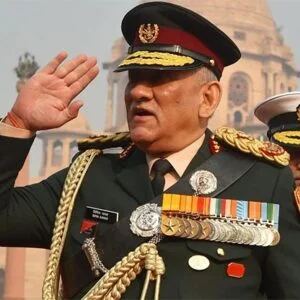New Delhi: In words of encouragement to indigenous defence industry, Chief of Defence Staff General Bipin Rawat said that there could be no greater satisfaction for the armed forces than fighting and coming out victorious in war with indigenous technology and equipment.
Speaking at a seminar on promoting self reliance in defence, General Rawat said on August 27 that India’s armed forces are committed to hand-hold the domestic industry in developing next generation military platforms and equipment.
Delving into complex security scenario, he said as India grows in stature, the security challenges are bound to increase “exponentially”.
“Nothing will give us greater satisfaction than fighting and coming out victorious in wars with indigenous technology and equipment,” he said, adding the armed forces do not have any bias towards imported equipment.
He said industry leaders should ensure a time-bound defence procurement process as this is the key focus of the newly-created Department of Military Affairs (DMA).
The seminar was attended by Defence Minister Rajnath Singh and chiefs of the Indian Army, Indian Navy and the Indian Air Force.
“India today is transiting through a period which is chequered with numerous challenges and threats. Our collective response to COVID-19 has firmly established our ability to overcome any such unforeseeable eventuality,” he said.
The Chief of Defence Staff (CDS) also debunked the perception that the armed forces prefer imported equipment.
“I would like to reiterate our unequivocal assurance of our commitment to procuring indigenous equipment and weapon systems. This reiteration is necessary because at times we are incorrectly perceived to have an import bias. In reality, nothing could be further from reality,” he said.
“The combined size of armed forces, huge inventory, the technology spread of the equipment and need for its constant upkeep and maintenance provides a viable market to Indian industry,” he added.
Gen Rawat also elaborated on various policy initiatives by the government to promote the domestic defence industry and said the strength of the Defence Research and Development Organisation (DRDO) should be utilised in bringing out new equipment and technologies.
“We have a very strong private sector and we can leverage our market access to make India a global hub for design and manufacture of defence equipment and further integrate into global supply chain,” he said.
He urged the defence industry to invest in research and development in the field of diverse technologies, particularly in the area of niche and disruptive technologies.
“The armed forces are committed to supporting ‘Atmanirbhar Bharat’. We assure you of adopting a more transparent and open approach with industry to acquaint them with services requirements and understanding industry capability and limitations,” he said.
The government has already outlined its broad roadmap to make India a hub of defence manufacturing and has been taking policy initiatives to promote the domestic defence industry.
On August 9, the Defence Minister announced that India will stop import of 101 weapons and military platforms like transport aircraft, light combat helicopters, conventional submarines, cruise missiles and sonar systems by 2024.
In a related development, the DRDO identified 108 military systems and subsystems like navigation radars, tank transporters and missile canisters for the domestic industry to design, develop and manufacture.
The premier organisation said it will also provide support to industries for design, development and testing of these systems on a requirement basis. It has set a target of next year in developing the 108 systems and subsystems.
India is one of the largest importers of arms globally.
According to estimates, the Indian armed forces are projected to spend around US$130 billion in capital procurement in the next five years.
The government now wants to reduce dependence on imported military platforms and decided to support the domestic defence manufacturing.
The Ministry of Defence (MoD) has set a goal of turnover US$25 billion (Rs 1.75 lakh crore) in defence manufacturing in the next five years that included an export target of US$5 billion (Rs 35,000 crore) worth of military hardware.









